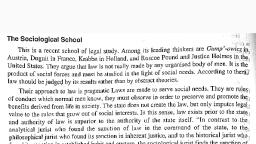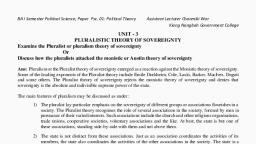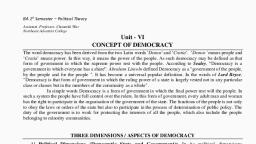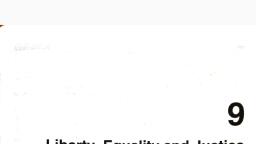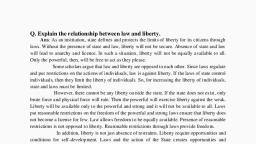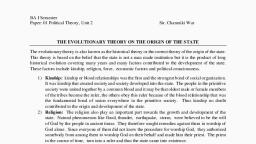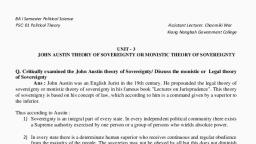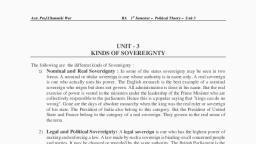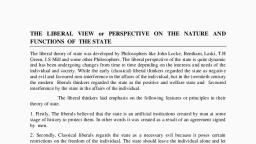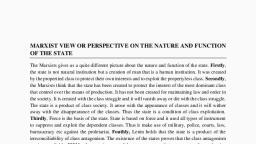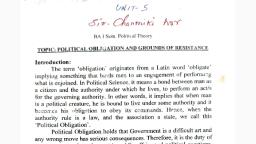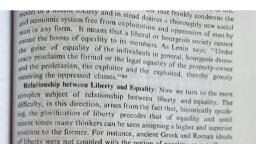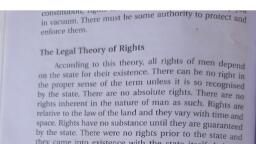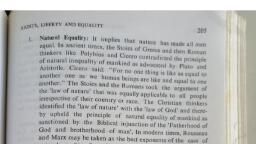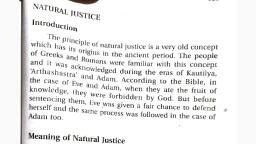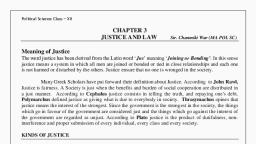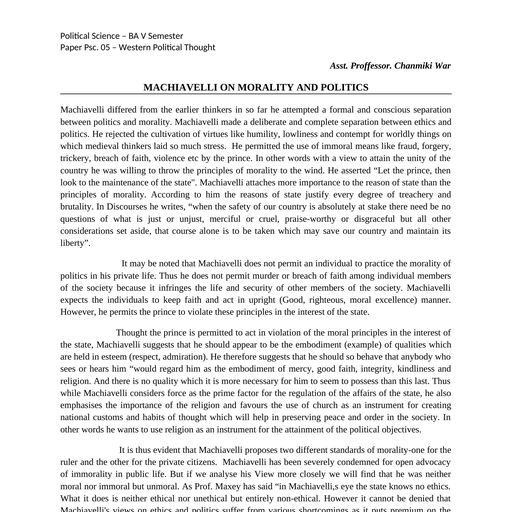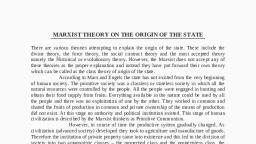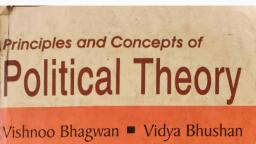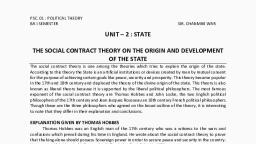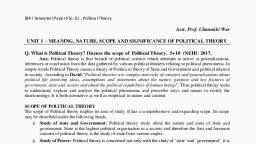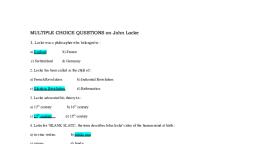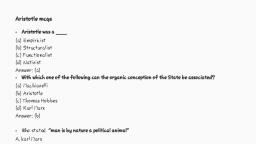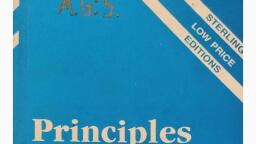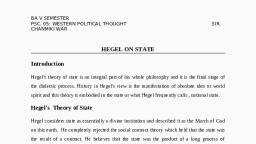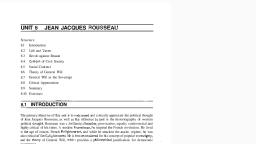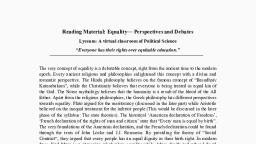Page 1 :
PSC. 01 : POLITICAL THEORY, BA I SEMESTER, , SIR. CHANMIKI WAR, , UNIT – 2 : STATE, THE SOCIAL CONTRACT THEORY ON THE ORIGIN AND DEVELOPMENT, OF THE STATE, The social contract theory is one among the theories which tries to explain the origin of the state., According to this theory the State is an artificial institutions or devices created by men by mutual consent, for the purpose of achieving certain goals like peace, security and prosperity. This theory became popular, in the 17th and 18th century and displaced the theory of the divine origin of the state. This theory is also, known as liberal theory because it is supported by the liberal political philosophers. The most famous, exponent of the social contract theory are Thomas Hobbes and John Locke, the two English political, philosophers of the 17th century and Jean Jacques Rousseau an 18th century French political philosophers., Though these are the three philosophers who agreed on the broad outline of the theory, it is interesting, to note that they differ in their explanation and conclusions., , EXPLANATION GIVEN BY THOMAS HOBBES, Thomas Hobbes was an English man of the 17th century who was a witness to the wars and, confusions which prevail during his time in England. He wrote about the social contract theory to prove, that the king alone should possess Sovereign power in order to secure peace and security in the country., He expressed his ideas in his famous book "Leviathan" published in 1651., According to Hobbes before the birth of the state, people live in the state of nature which has no, organisation, laws and discipline. In this state of nature the people were selfish, egotistic and fierce, (aggressive, extreme violent) like the wilds animals. Friendship, compassion and sympathy had no idea in, their undeveloped hearts. They were completely unconcerned to the feelings of others but ready to rob, and kill. There was suspicious, hatred and violence among men, civilization had not developed, life was, insecure, might was right. It was a very gloomy and horrible conditions. Thus the state of nature according, to Hobbes was a condition of perpetual (constant, unending) war "where every man is the enemy of every, man and life was solitary, poor, nasty, brutish and short"., In order to overcome the horrible situations and insecure conditions of life people assemble, together and had an agreement among themselves and they established the state. By that contract,, people surrendered all their rights to the ruler who was not a party to the contract but became Sovereign, as a result of it. They agreed to be ruled by him in return for peace and security. The ruler was not bound, by any condition. He could exercise unlimited powers and make any law and enforce it among the people., The people had to obey without questions because they had surrendered all their rights. The Sovereign, ruler or king, thus holds an absolute, unlimited, inalienable and indivisible authority., , EXPLANATION GIVEN BY JOHN LOCKE, John Locke was also a 17th century English man who was a witness and supporter of a Glorious, Revolution of 1688. He expressed his ideas about the origin of the state in his book "Treatise on, Government" published in 1960., John Locke explained that before the state came into existence, the conditions of people was not, as bad as pointed by Hobbes. According to Locke people in the state of nature could live happily, enjoying, natural rights and obeying natural law. There was security of life and property also. Life in the state of, nature was one of "peace, good will, mutual assistance and preservation"., However there was one defect in the state of nature that is each person did whatever he, considered right according to his own reasoning. Naturally there was misunderstanding and clashes. There
Page 2 :
PSC. 01 : POLITICAL THEORY, BA I SEMESTER, , SIR. CHANMIKI WAR, , was no organisation or authority to decide who was right and who was wrong. There was none to settle, the dispute that might take place among the inhabitants. Such conditions was not convenient to the, people. In order to overcome this difficulty people assemble together and came to an agreement among, themselves., According to Locke there were actually two contracts namely the civil contract and the, governmental contract. In the civil contract all persons agreed to establish an order in the society and thus, created the state. In the governmental contract people agreed to surrender some of their natural rights, to a ruler who could decide all disputes and differences among people and enforce uniform law in the, community to safeguard the life, liberty and property of the people. They also laid down certain conditions, to be followed by the ruler. The ruler agreed to the conditions and thus became party to the contract and, he could exercise and enjoys only limited powers in the interest of the people. If he fails to perform his, duty well the people had the right to remove him and replace him with another ruler. Thus Locke in his, theory, he supports constitutional monarchy or limited monarchy and there are seeds of democracy in his, conclusion., , EXPLANATION GIVEN BY JEAN JACQUES ROUSSEAU, Rousseau was a French Philosopher of the 18th century. He expressed his ideas about the origin of, the state in his book "Social Contract" published in 1762., According to Rousseau men lived a free, simple, happy, healthy and honest life in the state of nature., There was no enmity and cruelty anywhere and happiness reign all over. The size of the population was, small, the needs of men was very few and nature provided all their requirements in plenty. Therefore, there was no clash, fighting or conflict among the people because the institutions of family and private, property did not exist. Rousseau 's state of nature was like 'an earthly paradise where the life of the, inhabitants was one of 'idyllic bliss'., However this condition did not last long. With the passage of time certain difficulties arises in the, state of nature. The beginning of reason, sense of private property and increase of population made life, complicated. The emergence of personal disputes, murder, panic, war and absence of sympathy and, fellow-feeling made life intolerable and miserable., In order to overcome this difficulty people assemble together and had an agreement among, themselves and they created the state. Rousseau says that the individuals surrendered all their rights to, the society or community of which everyone of them was a partner. Thus the opinion of all the people,, what Rousseau termed as 'General Will' became sovereign in the state. The general will established the, role in the state and act for the welfare of the people. The sovereignty of the General Will is absolute,, unlimited, permanent and universal. The concept of General Will is the basis of democracy. Therefore it, is evident that Rousseau was a supporter of democracy in the state. His concept is also the basis of popular, sovereignty., , CRITICISM, The social contract theory is criticized as bad history, bad logic and bad philosophy. Several critics have, pointed out the various defects of this theory., Firstly, it is pointed out that the theory is historically wrong. There was no evidence in history to, show that the primitive people had an agreement among themselves to establish the state. Thus the, whole theory is based on false assumption., Secondly, it is impossible to believe that men in the state of nature could possess such a highly, developed political consciousness as to enter into a contract and create the state., Thirdly, the theory is considered to be illogical. Hobbes, Locke and Rousseau maintain that the, primitive people enjoy certain natural rights, but logically speaking there would be no right in the state of
Page 3 :
PSC. 01 : POLITICAL THEORY, BA I SEMESTER, , SIR. CHANMIKI WAR, , nature which had no organisation at all. A right is a condition which is recognised and enforce by the state., But since there was no state or organised society the people in the state of nature did not have rights., What they had was might (power) only., Fourthly, from the legal point of view also the theory is defective. A Contract is possible only if there, is some authority to enforce it. It is difficult to envisage how the people living in the state of nature could, enter into a contract without a third party which could enforce it. And if there was a third party which, existed, it could be none else than the state. And if the state was already in existence, there was no need, of a Contract., Due to these criticism the theory of social contract stands discarded.

